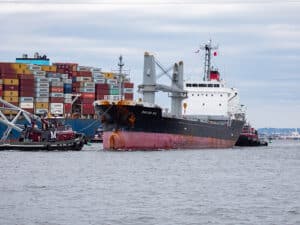
Op-Ed: Using clean tech in the energy transition
Written by Heather Ervin
Nippon Paint Marine
By Hirokazu Kaji, technical director at Nippon Paint Marine
The outcomes of MEPC 80 follow a rising industry trend of tightening regulatory imperatives to reduce shipping’s greenhouse gas emissions. These updated targets, combined with growing global pressure and awareness of shipping’s role in the energy transition, have created new urgency for shipping to act now to support the journey to net zero.

The delivery and uptake of a new generation of viable zero-carbon fuels will be essential to meeting not only IMO targets, but also the expectations of other regulators and stakeholders across the supply chain. However, the road to future fuels is long and complex. It will require the development of a sophisticated green shipping value chain, including new bunkering infrastructure, the associated regulatory standards, as well as the collaboration of all industry stakeholders to manage the transition.
While future fuels will undoubtedly have a huge accelerative impact on the industry’s decarbonization, if shipping is to meet its targets, shipowners and operators must adapt and evolve their operations today, rather than waiting for a “silver bullet” solution in the future. This is why the adoption of clean technology has never been more important to drive immediate emissions reductions, regardless of whichever fuel is used now or in the future.
Uncertainty lingers
Despite the urgency to reduce emissions, shipowners remain somewhat skeptical about the impact and viability of clean technology. This is largely based on a lack of R&D and verification of efficiency claims made by some companies, plus other concerns around investment of time and energy when it comes to installation.
However, this dynamic needs to rapidly change, as regulations such as the CII and EEXI have already come into force and will focus on performance metrics and levels of emissions. Charterers and cargo owners want to charter the most efficient vessels and so there is an imperative for ship owners to demonstrate enhanced levels of operational, environmental, and cost efficiency and sustainability.
Those that do this effectively will be more competitive and will ensure their compliance with future regulations; the best way to make a start on these aims today is to adopt proven clean technologies. Finding proven solutions amidst a diverse market of clean technologies is achievable thorough due diligence and analysis, working with manufacturers that demonstrate rigor in the R&D and testing processes and can verify the efficiency savings that they claim to deliver.
Marine coatings—an unsung hero
Vessel marine coatings are one of the oldest and most widely used clean technologies to improve operational performance, provide greater fuel efficiency and reduce emissions in the maritime industry. Every vessel must have a hull coating, which provides the industry with a unique and ubiquitous opportunity to reduce fuel consumption, its associated costs and emissions through the latest anti-fouling technology.
Keeping a ship’s hull free from biofouling reduces friction and drag resistance, meaning less fuel, power and energy is needed to maintain the same speed, resulting in reduced emissions. Given the exponential price increase that will come with low and zero-carbon fuels, technologies that can reduce fuel consumption and the cost of operation will be essential.
Marine coatings that provide ultra-low friction can support shipowners in meeting increasing regulatory requirements, delivering more sustainable operations, and reduce fuel consumption and emissions. Low-friction antifouling solutions like Nippon Paint Marine and its FASTAR is designed to minimize the effect of seawater temperatures and vessel speeds and other external factors have on coating performance. These factors enable coatings like FASTAR by Nippon Paint Marine to lower fuel consumption under a wide range of ship operating conditions by up to 8% compared with standard coatings without proven biomimetic or low-friction properties.
Fuel efficiency will be crucial on the road to net-zero, with renewed pressure to decarbonize coming from MEPC 80. As the industry moves towards alternative fuels, which will have much higher cost implications, marine coatings will play a key role in helping organizations to meet their sustainability goals, whilst also remaining profitable. What’s more, with significant uncertainties remaining over the wide availability of future fuels, established and proven clean technologies like marine coatings can ensure that companies are able to drive meaningful emissions reductions, regardless of what the future holds.




